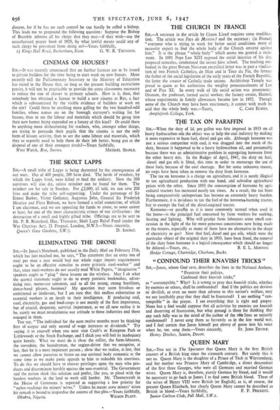T - IE TAX ON PARAFFIN Sig,—When the duty of Id. per
gallon was first imposed in 1933 on all heavy hydrocarbon oils the object was to help the coal industry by making it more expensive to burn fuel, diesel and gas oils. 41though kerosene was not a serious competitor with coal, it was dragged into the mesh of the duty, because it happened to be a heavy hydrocarbon oil, and presumably because there was an administrative problem in segregating kerosene from the other heavy oils. In the Budget of April, 1947, the duty on fuel, diesel and gas oils is lifted, this time in order to encourage the use of these fuels because of the coal shortage. But for some unknown reason, no steps have been taken to remove the duty from kerosene.
The tax on kerosene is a charge on agriculture, and it is surely illogical to tax agricultural production with one hand, and subsidise agricultural prices with the other. Since 1933 the consumption of kerosene by agri- cultural tractors has increased nearly ten times. As a result, the tax from being comparatively unimportant has become an extremely heavy burden. Furthermore, it is invidious to tax the fuel of the kerosencs-buming tractor, but to exempt the fuel of the diesel-engined tractor.
Kerosene—or paraffin as it is more commonly termed when used in the home—is the principal fuel consumed by farm workers for cooking, heating and lighting. Who will grudge farm labourers some small con- cession in the light of the far more generous concessions now being made to the miners, especially as many of them have no alternative in the shape of electricity or gas? Now that fuel, diesel and gas oils, which were the particular object of the original duty in 1933, have been freed, the removal of the duty from kerosene is a logical consequence which should no longer


































 Previous page
Previous page